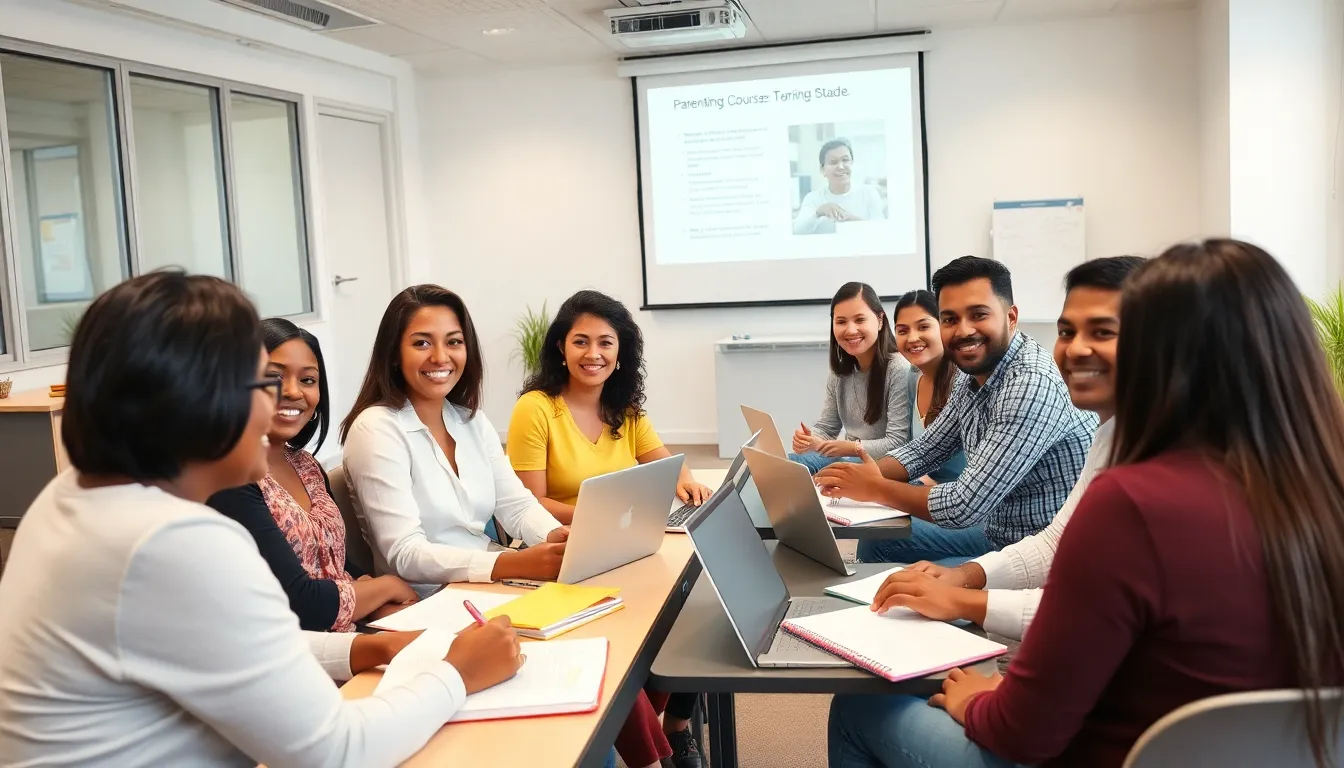Parenting can feel like a never-ending rollercoaster ride—one moment you’re soaring high with joy, and the next, you’re plummeting into the depths of toddler tantrums. It’s a wild adventure, and sometimes, a little guidance goes a long way. Enter parenting courses, the secret weapon for parents seeking to navigate this chaotic journey with confidence and a sprinkle of humor.
Table of Contents
ToggleOverview of Parenting Courses
Parenting courses provide essential tools for navigating the challenges and complexities of raising children. These programs cover various topics, including child development, effective discipline strategies, and communication skills. Parents gain insights from experienced instructors, which enhances their ability to manage daily parenting scenarios.
Many courses offer flexible formats, such as online classes, workshops, and in-person sessions. Online courses accommodate busy schedules, allowing participants to learn at their own pace. Workshops foster in-person interaction, enabling parents to share experiences and support one another.
Some courses target specific age groups, such as infants, toddlers, or teens. Understanding developmental stages prepares parents for age-appropriate challenges. Courses also address specialized topics, including special needs or single parenting, ensuring relevance to diverse family situations.
Professional organizations, such as the American Academy of Pediatrics, endorse several parenting courses. These affiliations lend credibility and assurance, making it easier for parents to choose reputable programs. Parents often benefit from access to valuable resources, including handouts and follow-up support.
Participants frequently report increased confidence and reduced stress after completing courses. Feeling empowered allows them to approach parenting with greater assurance. Additionally, these courses create opportunities for networking with other parents, fostering a sense of community and shared learning.
Overall, parenting courses present a practical solution to the unpredictable nature of raising children. By investing time in education, parents equip themselves with strategies that can lead to a healthier family dynamic. The knowledge gained cultivates resilience, fostering growth for both parents and their children.
Benefits of Parenting Courses

Parenting courses offer a variety of benefits that can significantly enhance the parenting experience. They provide parents with essential knowledge and tools to navigate challenges effectively.
Enhanced Parenting Skills
Courses focus on developing practical skills tailored to the unique needs of parenting. Parents learn about effective discipline methods and age-appropriate communication strategies. Experienced instructors share insights that help parents understand child development stages. Learning these skills fosters confidence in handling everyday situations, such as tantrums or homework struggles. Many participants report feeling more equipped to make informed decisions that positively impact their children’s growth. Mastering these skills contributes to a well-informed parenting approach that nurtures a positive family environment.
Improved Child-Parent Relationships
Enrolling in parenting courses strengthens the bond between children and parents. Gaining insights into effective communication creates opportunities for open dialogue, fostering trust. Nurturing this trust leads to children feeling more secure and understood. Parents learn to recognize their children’s emotional needs and respond appropriately, which enhances empathetic interactions. Improved relationships often result in decreased behavioral issues, allowing for a more harmonious home life. Engaging in this shared learning experience also encourages quality time spent together, enriching the family’s emotional connections.
Types of Parenting Courses
Various types of parenting courses cater to different learning preferences and family needs. Parents can choose options that fit their lifestyles and goals.
Online vs. In-Person Courses
Online courses provide flexibility, allowing parents to learn at their own pace and schedule. Many platforms offer interactive materials and video lessons. In-person courses foster community engagement, enabling parents to connect with peers and share experiences. Both formats have their benefits, catering to diverse learning styles. Some parents prefer the convenience of online learning, while others seek the support found in face-to-face interactions.
Specialized Courses for Different Age Groups
Specialized courses target specific age groups, addressing the unique challenges of each developmental stage. Courses for infants may focus on attachment and breastfeeding, while toddler programs emphasize discipline and communication. School-age courses often cover academic support and social skills. Parents gain tailored strategies to nurture growth effectively. Adolescents bring a different set of challenges, where courses can focus on navigating independence and peer relationships. Each course type offers insights that align with a child’s immediate needs, ensuring parents feel equipped to provide the best support.
Choosing the Right Parenting Course
Selecting a suitable parenting course depends on various factors and expert recommendations. Parents should evaluate specific needs and preferences when making this decision.
Factors to Consider
Think about personal learning styles before enrolling in a course. Some may prefer the flexibility of online learning while others benefit from in-person interactions. Age-specific courses address particular developmental stages, ensuring relevance to current parenting challenges. Additionally, assess the course content to determine if it covers essential topics like discipline strategies or child communication methods. Consider the time commitment required and how it fits within a busy schedule. Accessibility to instructors and peer support enhances the learning experience, making engagement more effective.
Recommendations from Experts
Trustworthy sources offer valuable insights for choosing a parenting course. Recommendations from pediatric professionals, such as the American Academy of Pediatrics, provide credibility. Many experts suggest looking for courses led by experienced instructors who have real-world parenting experience. Explore reviews and testimonials from past participants, as these often reflect the course’s effectiveness. Courses that use evidence-based practices ensure that parents receive reliable guidance. Engaging with a course that matches personal values and parenting philosophies can lead to a more fulfilling learning experience. Ultimately, expert insights steer parents toward courses that equip them with practical skills and coping strategies for the complexities of raising children.
Parenting courses offer invaluable support for navigating the unpredictable journey of raising children. By equipping parents with essential skills and strategies, these courses help build confidence and reduce stress. Whether through online platforms or in-person workshops, they cater to diverse needs and schedules, fostering community and connection among parents.
The insights gained from experienced instructors enhance the parent-child relationship, promoting open communication and trust. As parents embrace the knowledge and tools provided, they create a nurturing environment that benefits both themselves and their children. Investing in a parenting course can be a transformative step toward a more harmonious family life.



